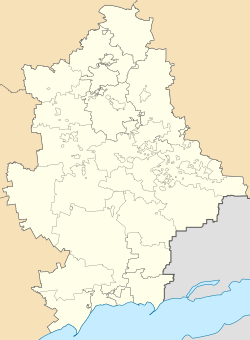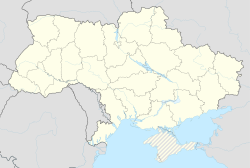Makiivka
Makiivka
Макіївка Makeyevka Макеевка | |
|---|---|
 | |
 Flag  Coat of arms | |
 Makiivka Location of Makiivka | |
| Coordinates: 48°05′00″N 38°04′00″E / 48.08333°N 38.06667°ECoordinates: 48°05′00″N 38°04′00″E / 48.08333°N 38.06667°E | |
| Country | Ukraine |
| Oblast | Donetsk Oblast |
| Raion | Makiivka City Municipality |
| Approx. foundation | 1696 |
| City rights | 1917[1] |
| Government | |
| • Mayor | Yuri Pokintelitsa |
| Area | |
| • City | 426 km2 (164 sq mi) |
| Elevation | 169 m (554 ft) |
| Population (2021) | |
| • City | 340,337 |
| • Density | 800/km2 (2,100/sq mi) |
| • Metro | 378,740 |
| Postal code | 86100-86180 |
| Area code(s) | +380 6232 |
| Website | Official site of Makiivka |
Makiivka, Makiyivka or Makeyevka (Ukrainian: Макіївка, romanized: Makíjivka, IPA: [mɐˈkijiu̯kɐ]; Russian: Макеевка, romanized: Makéjevka, IPA: [mɐˈkʲe(j)ɪfkə]), formerly Dmytriivsk, Dmytriyevskyi, is an industrial city in eastern Ukraine within the Donetsk Oblast (province). Located 15 kilometers (9.3 mi) from the capital Donetsk, the two cities are practically a conurbation. Makiivka is a leading metallurgical and coal-mining centre of the Donets Basin, with heavy industry and coking plants supporting the local steel and coal industries. While internationally recognized as part of Ukraine, the city has been under the de facto administration of the unrecognized Donetsk People's Republic since its capture by pro-Russian forces in 2014. It has a population of 340,337 (2021 est.)[2].
Subdivisions and local government[]
Makiivka comprises a total of 5 raions (districts):
- Hirnyk (Ukrainian: Гірницький район) — 107,835 inhabitants
- Kirov (Ukrainian: Кіровський район) — 52,768 inhabitants
- Soviet (Ukrainian: Радянський район — 53,007 inhabitants
- Center-City (Ukrainian: Центрально-Міський район) — 94,93 inhabitants
- Red Guard (Ukrainian: Червоногвардійський район) — 81,042 inhabitants
The city municipality of Makiivka includes also the following urban-type settlements (Ukrainian spellings are followed by Russian ones in parenthesis):
|
|
The mayor of the city is (Ukrainian: Мальцев Олександр Миколайович) who was born in Makiivka in 1956.
Demographics[]
As of the 2001 Ukrainian census:[3]
- Ethnicity
- Russians: 50.8%
- Ukrainians: 45%
- Tatars: 1.1%
- Georgians: 0.3%
- Greeks: 0.3%
History[]
For a long time Makiivka was thought to have been established in 1777, but recent research shows that it has been mentioned in historical records since approx. 1696[citation needed]. The first mine was opened in 1875. In 1899 metallurgical settlement was founded nearby called Dmytrievsk, named after Dmitry Ilovaisky, son of count Ilovaysky - the landlord of the region.
Makiivka was only a small village when it was combined with nearby Dmytriivsk. Dmytriivsk subsequently developed as one of the largest coal-mining and industrial centres of the Donets Basin coalfield. In 1931, Dmytriivsk-Makiyivka was renamed Makiivka.
During the War in Donbass the city town hall was taken over by pro-Russian separatists on 13 April 2014.[4] Since then Makiivka is controlled by the self-proclaimed Donetsk People's Republic[5]
Jews in Makiivka[]
In 1939, the Jewish population of Makiivka was 8,000. In the Operational Situation Report (USSR No. 177) of Nazi German Chief of the Security Police dated from March 6, 1942 it is stated that as a result of the measures carried out by Einsatzkommando 6, both the Horlivka and Makiivka districts had been made "free of Jews". Nazis executed a total of 493 people here, among them 80 political agitators, 44 saboteurs and looters, and 369 Jews.
In September 2006, the first synagogue has been consecrated in Makiivka after almost 70 years. The house at 51 Lva Tolstogo street serves not only a synagogue but also a community center for a Jewish community of Makiiivka containing 2,000 members. The chief rabbi of Makiivka is . Makiivka Jewish community chairman is .
Economy and transport[]
Industry[]

There are many coal mines in and around the city. Makiivka's modern industries include one of the largest integrated iron and steel works in Ukraine. There are also other metalworking and coke-chemical plants and factories for , shoemaking, and food processing. The city is rather dispersed, with numerous residential communities surrounding individual industrial plants over an extensive area. It is gradually extending to form a single metropolitan area with the nearby city of Donetsk, which lies just a few miles to the southwest. Makiivka is home to the Donbas National Academy of Civil Engineering and Architecture.
The largest enterprises in Makiivka are: State enterprise "Makeyevugol" - open joint-stock company "Makeyevsky Metallurgical Works" - open joint-stock company, "Yasinovsky Coke-chemical Plant", and the limited company "Makeyevcoke".
There are also many machine-building enterprises within the city, with the most significant being: open joint-stock company "Granit", open joint-stock company "Stroymash", and the closed joint-stock company "Makeyevsky Mine's Automatic Machinery plant".
Makiivka metallurgical plant[]
The Makiivka metallurgical plant produced 1.029 million tons of steel and 825,000 tons of pig iron in 2005. It increased production of rolled steel 1.56-fold to over 700,000 tons in the January–July period of 2006, compared with the corresponding period of last year. It aims to increase its sales revenues to 1.265 billion hryvnia in 2006. The Nucor company (United States) intends to sign a contract with the Makiivka metallurgical plant on delivery of pig iron to the company's enterprises in the United States.
Transport[]
Makiivka is crossed by several railway lines: one is the Yasynuvata-Krynichna line (Russian: Ясиноватая-Криничная), and the other is the Mospyno-Makiivka freight line (Russian: Моспино — Макеевка грузовая). The city also contained a tram line (since 1925, but there are no tram routes now since 2006) and a trolleybus system (from 1969).
Trolley buses have 4 routes:
2 - City center - Main railway station Makeyevka-Passazhirskaja (Makeyevka Passenger)
3 - City center - Bazhanova settlement
4 - City center - Daki
5 - City center - Gornostayevskaya street.
There are plans to connect trolleybus networks of Donetsk and Makeyevka with direct intercity line to March 2013.
The city has a main passenger station Makiyivka-Pasazhirska, a railway junction Khanzhonkovo (situated in the settlement where Aleksandr Khanzhonkov was born), and minor railway stations:Krynichna, Monakhovo, Makeevka-Gruzovaya as well as a number of railway bays.
Culture[]
Religion[]
On the territory of Makiivka there are 22 churches, 73 religious organisations, and a women's monastery.
The city's inhabitants follow different religions, including:
- Ukrainian Orthodox Church - Moscow Patriarchate — 23 communities;
- Ukrainian Orthodox Church - Kyiv Patriarchate — 3 communities;
- Armenian Apostolic Church — 1 community;
- Roman-Catholic Church — 1 community;
- Islam — 2 communities;
- Jewish — 1 community;
- Krishna — 1 community;
- Protestant confessions — 41 communities.
Sport[]
Today, Makiivka has a total of 5 sport stadiums, 4 swimming pools, 90 sport gyms, 15 football fields, 5 children's sport schools, and 36 fitness rooms. There is also a sport school for physically disabled people.
Within the city, 35 different forms of sport are played, and there are a total of 35 sport organisations. There are also many campuses of the oblast's sport schools in Makiivka, including schools for: kickboxing, volleyball, heavy athletics, boxing, some other forms of wrestling, and judo.
Gallery[]

Flowers on the main street of Makiivka

Makiivka Institute of economy and humanitarian sciences

City hall

Party of Regions headquarters in Makiivka

Teatralna (Theatre) street

Central part of the city

Steelworkers' Palace of culture in Makiivka

Pioneers' palace
Hotel Mayak (Lighthouse in English)
Notable people[]
- Aleksandr Khanzhonkov (1877–1945) — pioneer of Russian cinematograph was a native of the city;
- (1915–1941) — Soviet biplane fighter ace, born in the city;
- Vladimir Zakharov (1901–1956) — Russian composer, manager of Piatnytskyi National Choir, musical editor of all-Soviet radio, born here;
- (1938—) — Ukrainian journalist and artist-designer who won 70 prizes on the international cartoon contests, born here.
- Yevhen Seleznyov — (1985—) Ukrainian football player
- Olga Savchuk — (1987—) Ukrainian tennis player
- Irina Yarovaya — (1966—) Russian political figure
- Denis Pushilin — (1981—) Head of the Donetsk People's Republic
Fictional[]
- Titanium Man, the Marvel Comics super-villain of Iron Man universe
References[]
- ^ "Юзовка. Статус города – из рук Временного правительства".
- ^ "Чисельність наявного населення України (Actual population of Ukraine)" (PDF) (in Ukrainian). State Statistics Service of Ukraine. Retrieved 11 July 2021.
- ^ Національний склад та рідна мова населення Донецької області. Розподіл постійного населення за найбільш численними національностями та рідною мовою по міськрадах та районах (in Ukrainian), archived from the original on 2012-02-07
- ^ "The towns in east Ukraine seized by pro-Moscow separatists". 2 May 2014.
- ^ "When hope is stronger than hardship: Bright ideas bring change to war-ravaged Ukraine". 8 September 2016.
External links[]
| Wikimedia Commons has media related to Makiivka. |
- museum.makeevka.com - Historical Museum of Makiivka (in Russian)
- makeevka.com - Portal Makiivka (in Russian)
- union.makeevka.com - Official site of Makiivka city television (in Russian)
- city.makeevka.com - Makiivka city site (in Russian)
- forum.icm.dn.ua - Makiivka city forum (in Russian)
- makeevka.h11.ru - Project "Makiiivka: all truth" (in Russian)
- free.gortransport.info[permanent dead link] - History of electrical transport in Makiivka (in Russian)
- infodon.org.ua - History of mining safety in Makiivka (in Russian)
- pvp.org.ua - News from Makiivka (in Ukrainian)
- Ukrainian heraldry - Makiivka (in Ukrainian)
- info.dn.ua - Information about the city (in Russian)
- Makiivka
- Don Host Oblast
- Populated places established in 1696
- Cities of regional significance in Ukraine
- Cities in Donetsk Oblast
- 1696 establishments in Russia
- Holocaust locations in Ukraine










